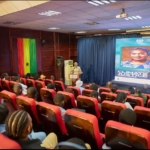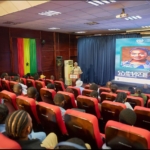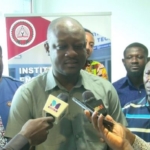
The Samuel T. Acheampong (S.T.A) Foundation, in collaboration with GIMPA Law Conferences and the ECO-AFRICA Network, has held Day 2 of its Climate Justice Conference, with a strong call for youth leadership, bolder policy action and cross-sector partnerships to advance climate justice in Ghana.
The conference, held on 4th April 2025 at the Dr Daniel McKorley Moot Courtroom, GIMPA, brought together government representatives, legal experts, civil society actors, youth advocates and sustainability practitioners under the theme: “Powering Change: The Role of CSOs and Youth in Advancing Climate Justice.”
Speakers and participants examined Ghana’s growing climate risks and stressed the need for justice-centred responses that protect vulnerable communities, strengthen resilience and empower young people to drive solutions.
The headline speaker, Hon. Alhaji Baba Issifu Seidu, Minister of State for Climate Change and Sustainability, reiterated the government’s commitment to a climate response that is “people-focused and justice-led.” He highlighted the plight of communities affected by flooding, drought and coastal erosion, and underscored the importance of fairness and long-term planning in climate policy.
He urged young people to remain at the forefront of clean energy, community-based initiatives and environmental advocacy, and encouraged civil society organisations to act both as partners in implementation and watchdogs to ensure accountability and transparency in climate action.
Delivering the keynote address, Hon. Justice Edward Amoako, Former President of the ECOWAS Court of Justice, focused on the legal and human rights dimensions of climate justice. He noted that effective climate action must rest on strong institutions, the rule of law and inclusive governance.
He stressed that climate justice is ultimately about protecting people’s rights and ensuring that communities bearing the harshest climate impacts are not excluded from decision-making processes. Justice Amoako further called on young people to build regional networks that promote evidence-based reforms and support stronger climate accountability frameworks across West Africa.
A panel discussion featuring Dr Prince Ansah, Georgina Boaama, Godfred Sowah Kpabitey and Mathias Charles Yabe explored practical ways in which CSOs and young innovators can influence Ghana’s climate future. Discussions covered green entrepreneurship, sustainable farming, climate data, community stewardship and policy engagement.
Panellists emphasised the need for grassroots participation, accessible climate education and meaningful opportunities for young people to shape national and regional climate policies.
Throughout the conference, speakers repeatedly highlighted the importance of partnerships. The collaboration between the S.T.A Foundation, GIMPA Law Conferences and the ECO-AFRICA Network was cited as an example of how institutions can pool expertise, networks and resources to amplify national dialogue, build capacity and implement impact-driven environmental initiatives.
For the Samuel T. Acheampong Foundation, partnership was reaffirmed as a core strategy in advancing its mission of youth empowerment, community development and sustainable environmental practices across Ghana.
The conference ended with a collective call to action for stronger policy reforms, deeper citizen engagement and expanded climate education. Participants agreed that, as climate pressures intensify, climate justice must be treated not as an option but as a shared responsibility for all sectors of society.
- President Commissions 36.5 Million Dollars Hospital In The Tain District
- You Will Not Go Free For Killing An Hard Working MP – Akufo-Addo To MP’s Killer
- I Will Lead You To Victory – Ato Forson Assures NDC Supporters
Visit Our Social Media for More



